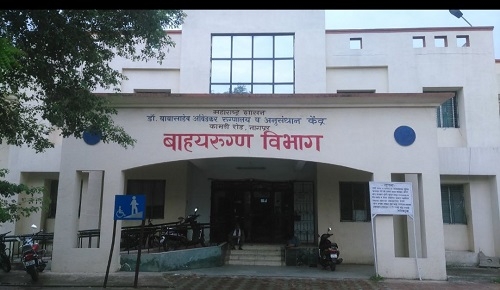Govt to bring PPP projects at Nagpur’s Dr Ambedkar Hospital
| Date :23-Apr-2022 |

Staff Reporter
As part of strengthening medical education and tertiary healthcare in Maharashtra Government is launching three Public Private Partnership (PPP) projects -- Greenfield development of a 615-bed super specialty hospital in Nagpur (Dr Babasaheb Ambedkar Super Specialty Institute), and Operation and Maintenance (O and M) of super-specialty hospitals in Government Medical College, Aurangabad, and Vilasrao Deshmukh Government Medical College, Latur. “Now, we want to have a strong system of healthcare in State. We will not allow any nonsense to happen. Whenever a new medical college comes up it will function only when it has full-time staff,” said Saurabh Vijay, Secretary, Medical Education Department.
The Government of Maharashtra has ambitious plans to strengthen the public health system for the benefit of the population. To deliver quality healthcare to all sections, the Government must modernise hospital operations and speed up the training of health professionals, particularly doctors.
Amit Deshmukh, Medical Education Minister said, “There is a strong need to expand medical colleges and establish new medical colleges. This in turn requires specialist faculty, for which there is an immediate need to expand super specialty hospitals and teaching across the State.”
The Government recognises that the public sector alone will find it difficult to deliver this scale of additional infrastructure and services in the required timeframe. In particular, the public sector finds it challenging to recruit skilled health professionals, doctors and specialists for super specialty care and medical colleges.
According to the standards of the World Health Organisation, there should be one doctor for every 1000
population. In case of Maharashtra, it is only 0.84 doctors for every 1000 population. In addition, there is a severe shortage of medical and superspeciality specialists, and per the current rate of availability of new postgraduates each year, it will take over 20 years to reach the desired ratios, pointed out Saurabh Vijay
“Expansion of existing facilities and establish new medical colleges and super-specialty hospitals across the State is a priority for Medical Education and Drugs Department.The Government of Maharashtra is seeking to develop the skills, experience and financing of the private sector to enhance the public health system, and to specifically address these priorities. One of the ways it is doing this is through Public Private Partnerships (PPPs),” explained Saurabh Vijay. In September 2021, Maharashtra adopted its strategic health PPP policy in line with its objective to provide affordable tertiary health care to all by 2030. Specifically, the policy aims to develop facilities for Super-specialty Healthcare and Medical Colleges, to strengthen teaching and manpower by leveraging private sector expertise and financing, as well as by pioneering the Government of India schemes for commercially viable PPPs. The policy envisions the potential development of six different models of PPP, ranging from Private Finance Initiative projects where private partners design, build, equip and maintain hospitals to full-service PPPs where clinical care is also delivered by a specialized operator,” pointed out Saurabh Vijay.
The Government will define key aspects of the projects - from the range of specialties to be provided, the quality they are to be provided at, to the number of medical students to be taught, through to ensuring that the very poor are able to access the hospital services and receive high quality care.
“Access will be ensured for patients covered under government backed insurance schemes and for poor patients while accepting commercially insured and private patients. All of this will be set out in the government's requirements, and the private sector partner will be expected to deliver to these requirements under the PPP contract,” said Saurabh Vijay. Saurabh Vijay stated, “Well-structured PPPs are not only a way to harness private finance and skills, but also a way to ensure that the public sector is able to pass certain risks that it is not best able to manage, to the private sector. Typically, these risks will include regulatory, construction, operating, demand, revenue and financing risks which will be effectively allocated between the public and private sectors.
For instance - increase in project cost due to cost and time overruns will not typically be borne by the Government in a PPP unlike in a standard public construction. When the PPP period ends, the infrastructure, equipment and services are handed back to the Government in a good state of maintenance and repair.”
